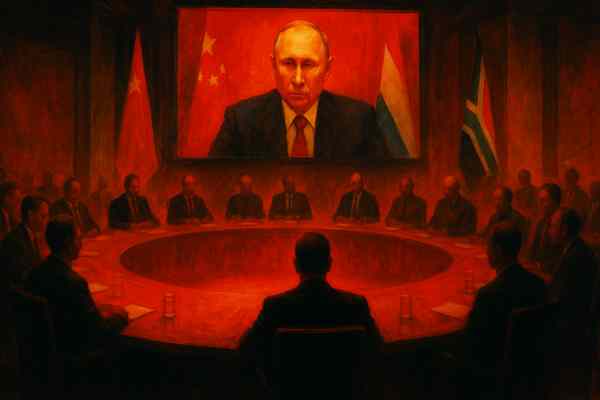Rio de Janeiro, 3 July 2025
The sand on Copacabana burns, but the BRICS conference room is sterile and cold. Waiters in white gloves serve dense coffee, and security guards in tailored suits ensure everyone stays in their designated seats. The whole place feels staged — like a theatre where each actor recites someone else’s script.
I'm here on assignment: “Cover BRICS’s transformation into a counterbalance to the Western unipolar world.” Spoiler alert: there will be no transformation.
Li Qiang – China
Instead of Xi Jinping, China sent its premier. Some whisper it’s safer this way — fewer uncomfortable questions, fewer awkward photos next to Putin. Li speaks in polished, sterile tones, like reading GDP figures from Excel.
Evaluation: disciplined, but cowardly.
Sergey Lavrov – Russia
Russia, as always, is present more as a shadow than a nation. Putin is “joining remotely,” which sounds almost like an admission: yes, we’re isolated. Lavrov repeats familiar phrases — “multipolarity,” “neo-colonialism,” “sovereignty” — then melts into the backdrop, as if afraid to be captured looking too alive.
Evaluation: loud, but empty.
Narendra Modi – India
Modi is the only one who looks straight into the cameras. He moves with confidence, offers smiles, and presents India as the “bridge between the Global South and the developed world.” His words are polished, strategic: yes, we’re with BRICS, but we also drink tea with Washington.
Evaluation: flexible, but calculating.
Lula da Silva – Brazil
The host of the summit. He talks about justice, poverty, the planet. Passionate, sincere — but vague. His proposals drown in subcommittees, like sugar in coffee. He still seems to believe speeches can change the world — touching, if this were 1992.
Evaluation: idealistic, but naive.
President Maramela – South Africa
The freshest voice. Speaks of a BRICS currency, detaching from the dollar. He wants to leap forward, but constantly glances sideways — aware that bold ideas invite frozen accounts and revoked visas.
Evaluation: daring, but nervous.
Final Scene
Lights up. The communiqué is read. Applause follows. “Strengthening strategic dialogue,” “institutional expansion,” “deepened cooperation.” No one mentions how. No one talks dollars. Not even Iran is condemned — just in case it sparks Western backlash.
This isn’t an alliance — it’s a risk pool. Everyone fears the same thing: angering America. Even here, thousands of miles from Washington, the shadow of the U.S. Treasury stretches across the negotiation table.
Mark’s Final Note
Conclusion:
BRICS still isn’t an alternative. It’s a waiting room — full of reformist masks and revolutionary whispers. But in truth, everyone falls silent when the global hegemon’s name is spoken. They are many, but not united. Loud, but not free.

